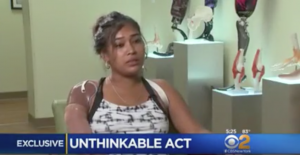ALBERTSON, N.Y.–(BUSINESS WIRE)–Did you know that almost one-third of women worldwide who have been in a relationship report that they have experienced some sort of physical and/or sexual violence by their intimate partner*? Two years ago, Progressive O&P was introduced by Help & Shelter, an organization founded in 1995 to work against all types of violence, to the tragic story of Natasha Houston. Just three years ago Natasha witnessed the death of her two children and lost her own arm and three fingers, a hideous crime committed by her boyfriend at the time. To read her full story click here.
 After hearing her heartbreaking story, the team at Progressive O&P were passionate about helping Natasha receive the best prosthetic care possible. After two years of waiting for a visa and finalizing arrangements, the team was happy to welcome her into the office last week. Certified Prosthetist Abe Mathews said, “Natasha’s level amputation makes this a challenging prosthesis, but the team and I are prepared to give her the best custom arm and hand possible.” Progressive O&P will provide Natasha with a custom painted cosmetic arm and hand, as well as an arm with a body-powered hand. “It’s like our tagline says, we are Restoring Hope and Renewing Lives. This is what we do every day and are happy to help such a deserving person like Natasha,” said Rob Von Bargen, a resident at Progressive who is working with Mathews on Natasha’s prosthesis.
After hearing her heartbreaking story, the team at Progressive O&P were passionate about helping Natasha receive the best prosthetic care possible. After two years of waiting for a visa and finalizing arrangements, the team was happy to welcome her into the office last week. Certified Prosthetist Abe Mathews said, “Natasha’s level amputation makes this a challenging prosthesis, but the team and I are prepared to give her the best custom arm and hand possible.” Progressive O&P will provide Natasha with a custom painted cosmetic arm and hand, as well as an arm with a body-powered hand. “It’s like our tagline says, we are Restoring Hope and Renewing Lives. This is what we do every day and are happy to help such a deserving person like Natasha,” said Rob Von Bargen, a resident at Progressive who is working with Mathews on Natasha’s prosthesis.
Natasha is only 23 and lives in a small village on the west coast of Guyana, with her new boyfriend and his two children. As a survivor of domestic violence, Natasha now volunteers as a spokesperson, speaking to victims across Guyana. Coming from a country that simply could not supply Natasha with a proper prosthesis, she feels excited, grateful and a little nervous about what Progressive is giving to her. When asked what a prosthesis means to her, she smiled and said, “It will make me more confident and feel more secure.”
*World Health Organization Fact sheet N°239
